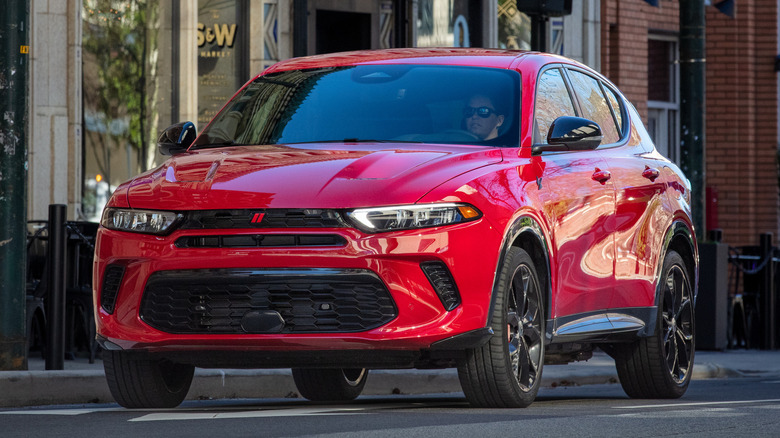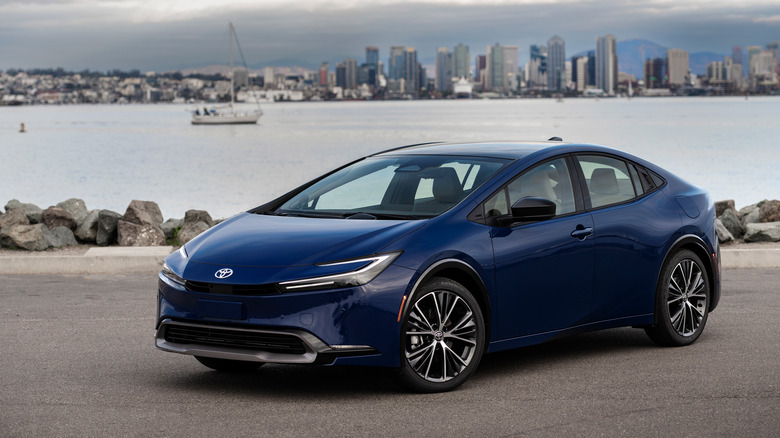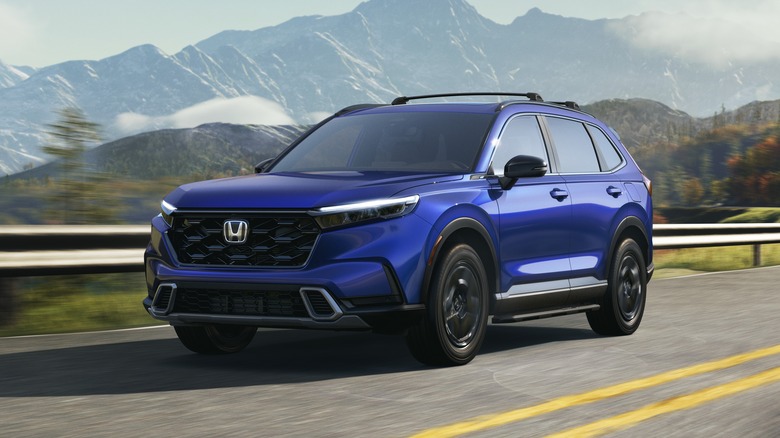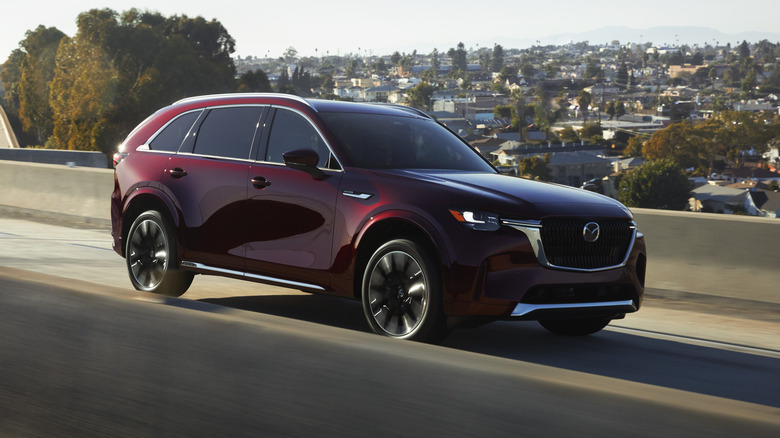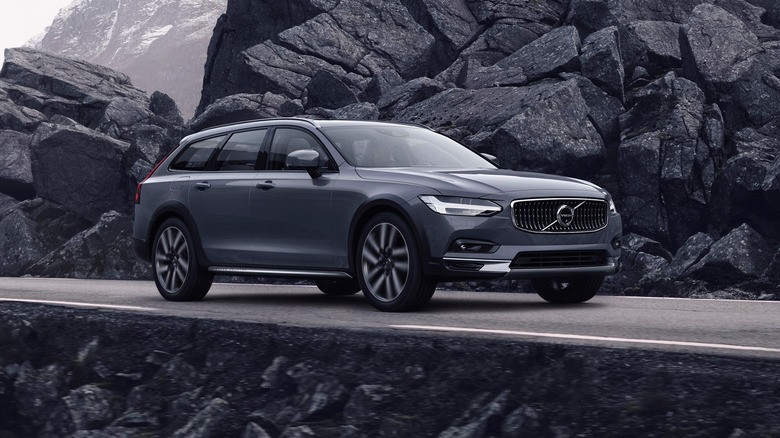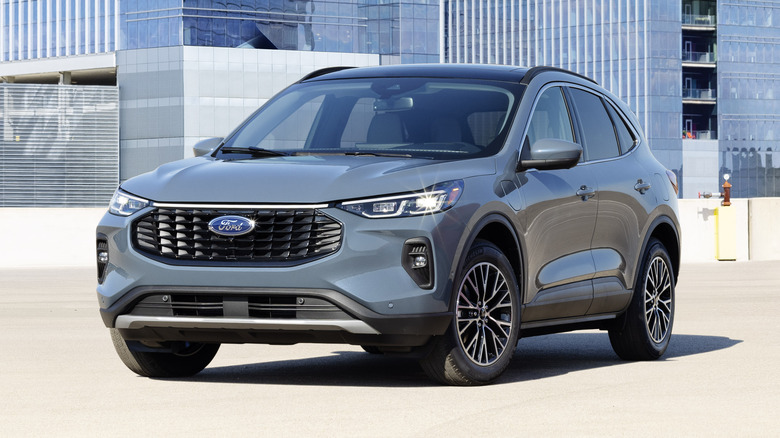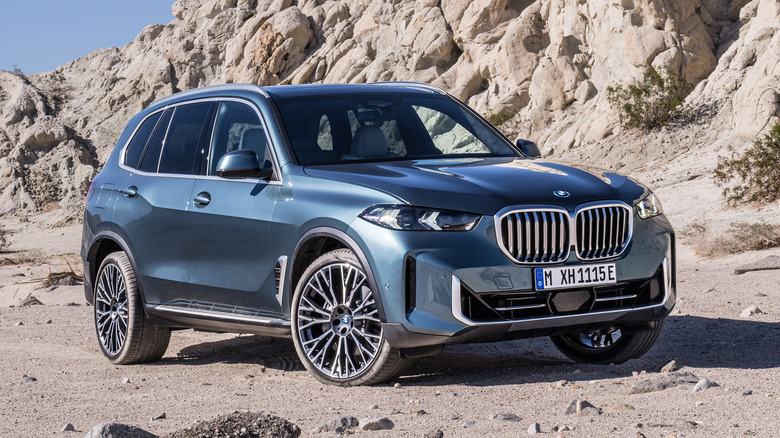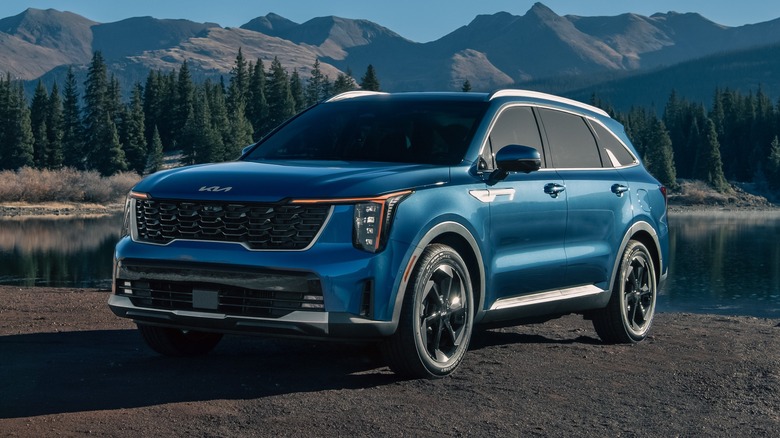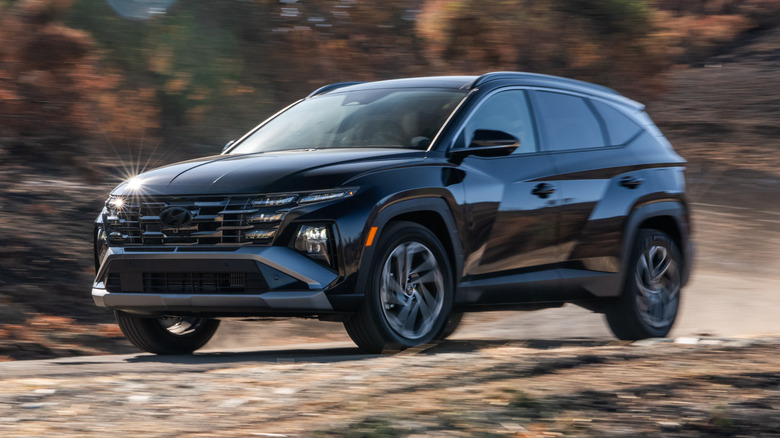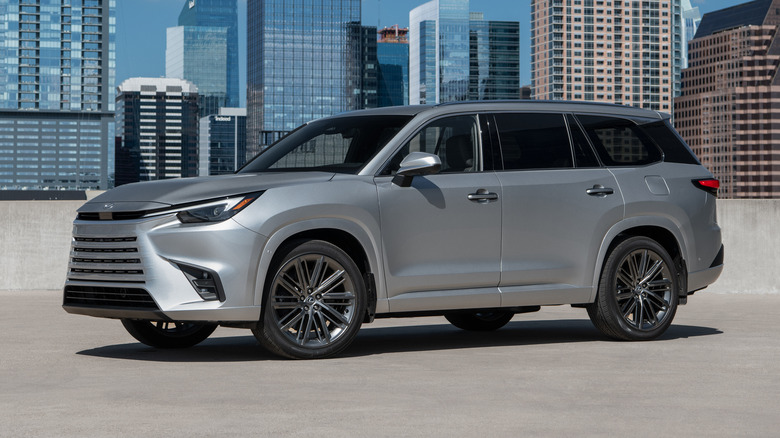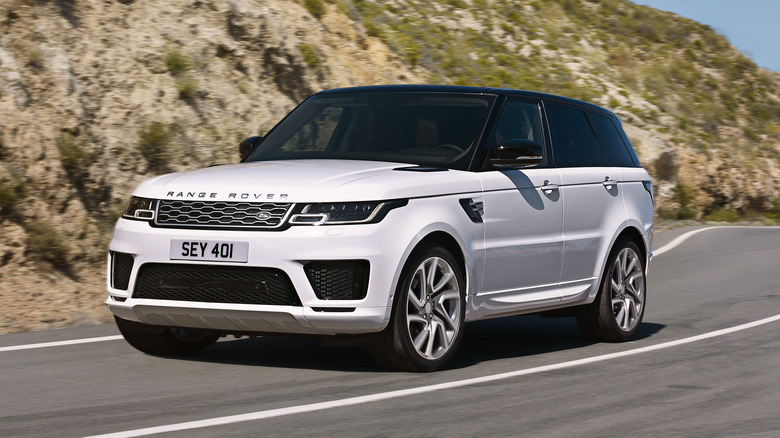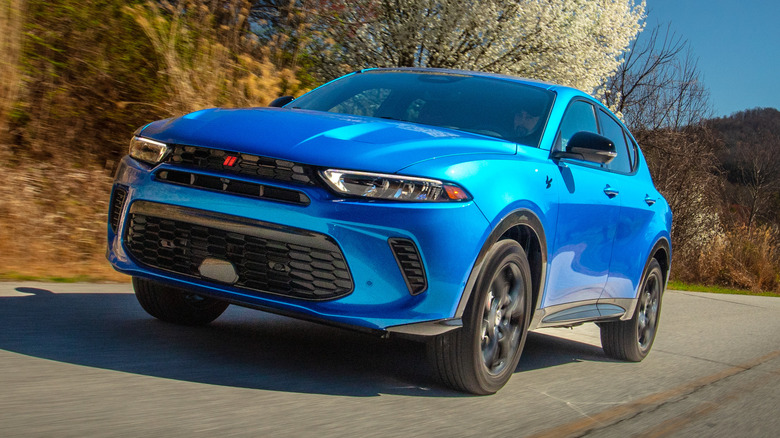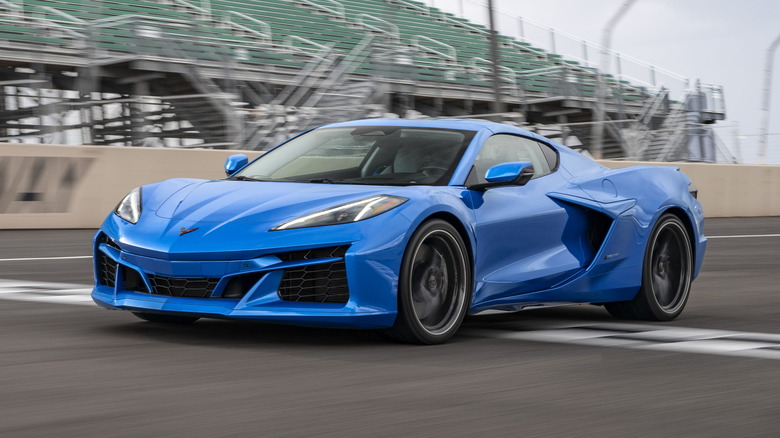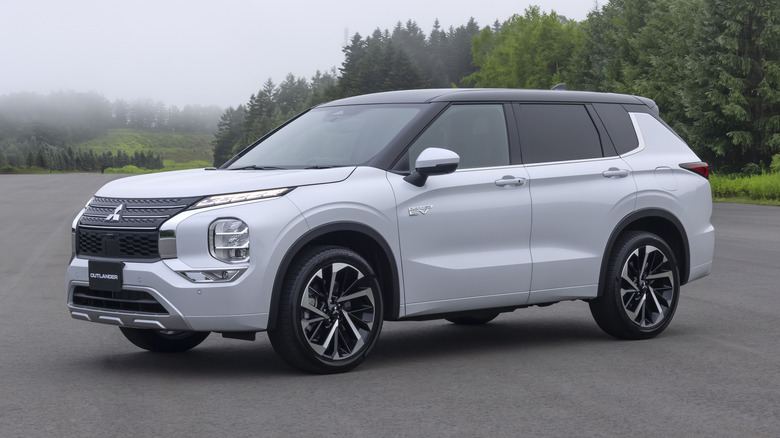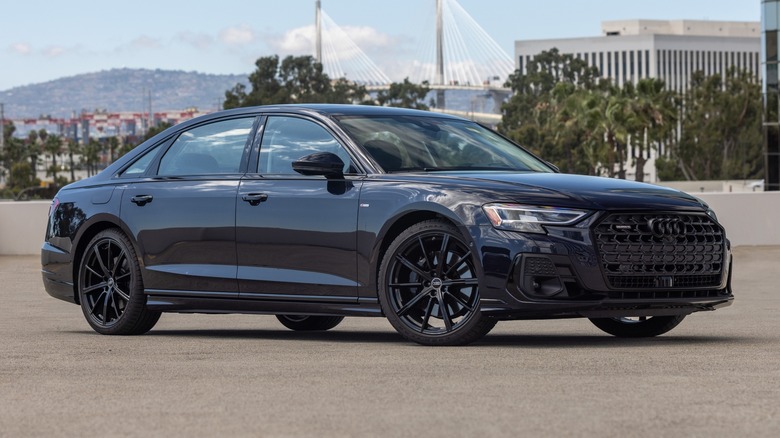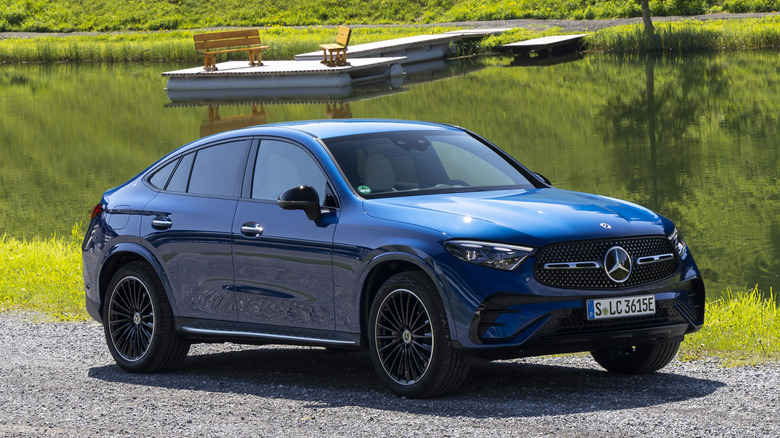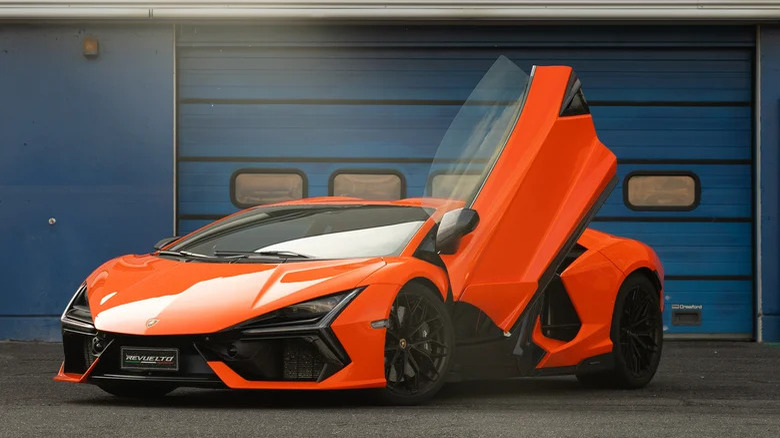Every New Hybrid Car With AWD You Can Buy In 2024
Hybrid cars offer the best of both worlds to buyers who aren't sold on making the switch to full electrification. They're more efficient than their purely gas-powered counterparts — often significantly more so — but there's no need to worry about finding a charging station on longer road trips. Today, hybrids are offered in a variety of flavors, from mild hybrids to plug-in hybrids (PHEVs), with the latter offering usually enough all-electric range for daily commutes.
All-wheel-drive cars also offer an extra layer of versatility, giving drivers added peace of mind in adverse weather conditions and on a wide variety of surfaces both on and off-road. That makes all-wheel-drive and a hybrid powertrain a popular combination among buyers, and there are plenty on the market to choose from. Some manufacturers only offer one all-wheel-drive hybrid option, while others have a dozen or more all-wheel-drive hybrid models in their current lineup. We've trawled through spec sheets to bring you a list of every popular car currently available as an all-wheel-drive hybrid as of this writing, grouped by manufacturer.
A quick disclaimer: the list only includes passenger cars, crossovers, and SUVs with hybrid powertrains and all-wheel-drive. Trucks, commercial vehicles, and hybrids with four-wheel-drive are not listed here.
Toyota
Toyota offers one of the biggest ranges of all-wheel-drive hybrids on the market, with models covering most major segments. The Grand Highlander Hybrid, Highlander Hybrid, and RAV4 Hybrid SUVs all offer the combination, while the RAV4 Prime PHEV offers plug-in versatility with up to 42 miles of all-electric range. Toyota's most affordable cars aren't left out either, with the Corolla Hybrid and Corolla Cross Hybrid both offering all-wheel-drive electrified options for under $30,000.
The Crown and Crown Signia models are both recent additions to the Toyota lineup, but both are also offered in all-wheel-drive hybrid form, as is the often overlooked Venza. Each of the three shares the same 2.5L four-cylinder hybrid powertrain that's found across much of the brand's hybrid lineup. The Camry is also available with the same powertrain, as is the Sienna minivan.
Finally, Toyota's most famous hybrid model is the Prius, which is offered in all-wheel-drive form with a 2.0L hybrid powertrain for 2024. SlashGear put the Prius through its paces at the launch of the current generation, and found it to be a more well-rounded car than ever, offering comfort, efficiency, and much sharper styling than previous generations.
Honda
In sharp contrast to its long-standing domestic rival Toyota, Honda only offers one all-wheel-drive hybrid in its current lineup, although it also offers multiple hybrids with front-wheel-drive. The CR-V Hybrid is the brand's all-wheel-drive hybrid option, and that should come as no surprise — the CR-V is a bestseller in its segment but faces plenty of tough competition, so it's natural that Honda would want to make it appealing to as wide a pool of buyers as possible.
Combining the efficiency of a hybrid powertrain with the all-weather capability of all-wheel-drive is a great way to do that, although Honda hasn't gone as far as offering a plug-in variant for buyers looking to take a further step toward electrification. Instead, buyers not satisfied with the electrically assisted 2.0L four-cylinder powertrain on offer in the CR-V Hybrid only have the option of one Honda BEV, the recently launched Prologue SUV.
Mazda
Another Japanese manufacturer, Mazda, has taken a different approach again in its electrification strategy. The company is betting that buyers will want the flexibility of a plug-in hybrid, and accordingly, both its current all-wheel-drive hybrid offerings are PHEVs. The cheapest of the two is the CX-70 PHEV, which starts a little under $52,000 including fees for the 2025 model year.
Buyers looking for a third row of seats can instead opt for the CX-90 PHEV. Both models share the same 2.5L hybrid powertrain churning out 323 horsepower. Mazda is also set to launch a cheaper hybrid CX-50 crossover for the 2025 model year, but as of this writing, it remains unavailable to purchase. Power is significantly down compared to both the CX-70 PHEV and CX-90 PHEV, with the CX-50 Hybrid set to make a more modest 219 horsepower. However, it will be available with all-wheel-drive, just like its larger and pricier stablemates.
Volvo
Volvo's range of all-wheel-drive hybrids is almost as large as Toyota's, with most of its popular models offering both options. Volvo buyers can choose from both mild and plug-in hybrids, with four models being the latter: the XC90 Hybrid, XC60 Hybrid, S90 Hybrid, and V60 Hybrid. The plug-in S60 Hybrid also remains available with limited inventory as of this writing, but its production was discontinued in June 2024 to make way for the all-electric EX90.
In addition to those plug-in hybrids, Volvo also offers a long list of mild hybrid models with all-wheel-drive. The XC90 is the largest of its SUV offerings, with the smaller XC60 and XC40 models also being available in the same configuration. The S90 luxury sedan and its wagon counterpart the V90 Cross Country also tick both boxes, as does the smaller V60 Cross Country. Much like its plug-in hybrid counterpart, the mild hybrid S60 is available only with limited inventory.
Ford/Lincoln
American manufacturers offer significantly fewer hybrids than their foreign rivals in general, but Ford and its upmarket arm Lincoln have two models each in their respective lineups. The Ford Escape can be bought in plug-in hybrid form for 2024, and the model also has a 2.5L four-cylinder mild hybrid on offer. Several of Ford's trucks and commercial vehicles are also available with varying degrees of electrification, but they're excluded from this list as it focuses on cars and SUVs.
Lincoln offers two SUVs with hybrid powertrains and all-wheel-drive, namely the Corsair and Nautilus. The former offers a 2.5L four-cylinder hybrid setup, while the latter comes with a turbocharged 2.0L four-cylinder hybrid powertrain under the hood. The brand's other two models, the Navigator and Aviator, remain without any hybrid options available for now, but Lincoln is reportedly planning to offer a hybrid option for all of its models by the end of the decade.
BMW
Nestled within BMW's sprawling current lineup is a wide range of plug-in hybrid and mild hybrid vehicles. The brand offers plug-in hybrid variants of its X5, XM, 5 Series, 7 Series, and M5, all of which are available with all-wheel-drive. The 330e, a plug-in hybrid 3 Series variant, has been discontinued for the 2025 model year, but other mild hybrid variants of the 3 Series remain available.
The 4 Series also gains a 48-volt mild hybrid for 2025, alongside the 5 Series, 7 Series, X3, X5, X6, X5 M, and X6 M. BMW hybrid push is a comprehensive one, and covers everything from its more everyday models to those at the bleeding edge of its performance range. Further BMW hybrid models are expected in due course, including a successor to the i8 halo car, which is rumored to be arriving as soon as 2026. The company is also expanding its range of all-electric vehicles, with the debut model of the highly anticipated Neue Klasse range set to be unveiled in production form imminently.
Kia
Two of Kia's popular SUV models, the Sorento and Sportage, are available in both hybrid and plug-in hybrid form for the 2025 model year. The Sorento Hybrid and Sportage Hybrid both pack a 1.6L hybrid powertrain with a combined output of 227 horsepower. The Sportage Hybrid is among the cheapest all-wheel-drive hybrid SUVs on the market, starting from just under $32,000 including fees for the base-spec LX trim.
Both the Sorento and Sportage also be optioned as plug-in hybrids for those looking for extra electrification, with the Sorento Plug-In Hybrid able to achieve up to 30 miles of all-electric range and the Sportage Plug-In Hybrid achieving up to 34 miles. The two models also boast a higher power output, with both offering a 1.6L turbocharged four-cylinder hybrid powertrain making 261 horsepower. Both do come at a notable price premium over other trims in their range, however, with the Sportage Plug-In Hybrid starting from roughly $41,000 including fees for the all-wheel-drive X-Line trim.
Hyundai/Genesis
Alongside Kia, fellow South Korean brand Hyundai also offers both hybrid and plug-in hybrid options for its most popular SUVs. The Tucson is available in both forms, with the Tucson Hybrid starting at just under $34,000 including fees in all-wheel-drive form for 2025. The Tucson Plug-In Hybrid starts from a little over $40,000 including fees.
The Santa Fe is also available as an all-wheel-drive hybrid that starts from around $39,000 including fees, although no plug-in hybrid is offered for the latest model year as of this writing. It's been given a thorough makeover for the 2024 model year, and now sports styling that takes inspiration from classic off-roaders like the Land Rover Defender and Toyota Land Cruiser. Make no mistake though, it's still far from an all-conquering off-roader, even if it looks like one.
Hyundai's luxury brand Genesis does have several all-electric models, but its lineup makes only the faintest nod to hybridization. The 2025 G90 features an "electric supercharger" in its top-spec V6, which is essentially a 48-volt hybrid system that serves primarily to increase the car's power output rather than to improve its efficiency. It works, too — with 409 horsepower on offer, the G90 is no slouch.
Lexus
While we've grouped some other luxury brands alongside their parent manufacturers, there are so many hybrid all-wheel-drive Lexus models on offer that the lineup deserves separate inclusion from its parent Toyota. Many of the brand's bestsellers are available in hybrid form, with an increasing number of PHEVs now available. The NX, RX, and TX are all available with plug-in charging capabilities.
All of the above Lexus PHEVs are SUVs or crossovers, but the brand does offer some passenger cars in hybrid all-wheel-drive form, too. They're not plug-in, though: the ES and LS luxury sedan both have to make do with a regular hybrid powertrain. Rounding out Lexus' electrified all-wheel-drive lineup are the UX, NX, and RX crossovers, all of which feature regular hybrid powertrains rather than plug-in. The NX and RX are the only two Lexus models to be currently offered in both regular hybrid and plug-in hybrid form.
Jaguar/Land Rover
British luxury automaker Jaguar is sticking to its plan of total reinvention, with the brand axing all of its models apart from the F-Pace after 2024 and aiming to transition to an all-new, all-electric lineup in the coming years. The F-Pace's P400 powertrain features a mild hybrid, and it was the only all-wheel-drive hybrid that Jaguar offered even before the brand axed all its other models.
Its sister brand Land Rover isn't axing its models in the same way, but has recently opted to divide its lineup into three sub-brands: Defender, Discovery, and Range Rover. The first two offer no hybrids in America as of this writing, but Range Rover offers three: the Range Rover, Range Rover Sport, and Range Rover Velar. Range Rover is the brand's flagship luxury model, while Range Rover Sport offers a nimbler — and slightly less pricey — alternative. The Velar is the cheapest of the three, with a sportier, more flowing design and less lavish options than its stablemates.
Alfa Romeo/Dodge
Stellantis twins Dodge and Alfa Romeo both only have one all-wheel-drive hybrid in their lineup, and it's essentially the same car underneath. The Alfa Romeo Tonale and Dodge Hornet Hybrid are each available with a 1.3L hybrid powertrain, with the Hornet Hybrid churning out 288 horsepower and the Tonale producing 285 horsepower. Both have a small amount of all-electric driving range, and despite having the edge on horsepower, it's the Hornet Hybrid that works out slightly cheaper to buy.
SlashGear tested the Hornet Hybrid at launch and found it to be a mixed bag, with our tester generally impressed by the car's powertrain but left inconvenienced after multiple issues with the car's electrics cropped up during our week of testing. We also weren't sold on the infotainment system, which was unnecessarily complicated and hid several everyday functions behind multiple layers of menus. Despite Alfa Romeo's reputation for electrical issues, SlashGear's week with the Tonale ironically went by without the same issues arising.
Chevrolet
While none of Chevrolet's everyday models are offered as all-wheel-drive hybrids as of this writing, its top-spec Corvette E-Ray does fit the bill. The E-Ray is the first Corvette of its kind, and boasts a combined output of 655 horsepower and a 0-60 mph time of just 2.5 seconds. It offers two distinct all-electric modes, Stealth mode and Shuttle mode, with the former being designed to creep out of driveways during early morning commutes and avoid waking the neighbors. It's functional up to 45 mph, but only offers four miles of range.
Shuttle mode, meanwhile, gives drivers and valets a way to park the car in crowded parking lots without waking its V8 engine. It's only functional up to 15 mph. It might add an extra layer of everyday practicality, the E-Ray's electric motor is primarily about performance. It works in tandem with the gas motor under high acceleration to make the E-Ray among the fastest accelerating cars in its class, and able to run a quarter mile in as little as 10.5 seconds.
Mitsubishi
Mitsubishi's only all-wheel-drive hybrid is the polar opposite of Chevrolet's offering. The Outlander PHEV is not a particularly exciting car, instead relying on a combination of practicality and comfort to win over buyers. It is available in a Ralliart trim though, complete with colorful Ralliart decals. It is not, however, a trim that turns the Outlander into some all-conquering spiritual successor to the Evo Lancer. Unfortunately, it's only a cosmetic package consisting of some visual extras and a special binder for your owners' manuals.
SlashGear reviewed the 2024 Outlander PHEV at the start of 2024, and found its cabin to be a pleasant place to spend time. It was also decently fast by segment standards, although never to the point where it actually felt exciting to drive. Being a seven seater, there's room for the whole family, and thanks to its hybrid powertrain, frequent school runs and soccer practice trips won't result in an excessive number of visits to the gas station.
Audi
Audi doesn't offer as wide a range of hybrids as its German rival BMW, and as of this writing, only one plug-in hybrid is available, the Q5 PHEV. Many of its other cars feature a 48-volt mild hybrid system, including the A3, A4, A5, A6, A7 and A8. Some of the brand's performance cars also feature hybrid assistance, including the RS6 Avant, which remained forbidden fruit to Americans until it was introduced stateside for the 2020 model year.
The swooping RS7 Sportback is also offered with a 48-volt system, as is the S5, S6, S7, and S8. Audi's SUV range is less ubiquitously equipped with mild hybrid technology, although high-profile models like the Q7, Q8 and RS Q8 all feature electric assistance. It's likely that hybrid technology will continue to be further deployed throughout the Audi lineup, particularly plug-in hybrids, since other markets have already received plug-in hybrid variants of other popular models including the Q7.
Mercedes-Benz
Mercedes-Benz has added mild hybrid technology to many of the models in its lineup, which remains huge despite the brand axing a significant number of poorly performing models in recent years. Its GLA, GLB, GLC, GLE, GLS, and G-Class SUVs can all be bought as all-wheel-drive hybrids, and that's just part of it. The GLC and GLE are also available as plug-in hybrids.
Its passenger car lineup is just as packed with all-wheel-drive hybrids, with the C-Class, E-Class, E-Class All-Terrain, S-Class, CLA, CLE, and CLE Cabriolet all ticking both boxes. The S-Class can be optioned as a plug-in hybrid which boosts its power to 503 horsepower. In case that wasn't enough choice, the AMG GT 63 S E Performance and AMG SL 43 Roadster also fit the bill. It's safe to say that virtually any buyer looking for power and efficiency will be able to find something that suits their tastes within the Mercedes lineup — however, whether they can cough up the six figure asking price required for some models is an altogether different question.
Other luxury brands
Buyers on the fence about whether they can afford one of Mercedes' hybrid lineup will need to skip straight past these other luxury brands. Porsche and Bentley both offer a range of all-wheel-drive hybrids to their well-heeled clientele, with the former currently producing the Cayenne and Panamera and the latter the Bentayga, Continental GT, and Flying Spur. Bentley does a particularly good job of catering to all tastes here, offering an SUV, coupe, and executive sedan respectively.
Even the world's most prestigious supercar makers have gotten in on the act, with Lamborghini launching its 1,000 horsepower Revuelto with a hybrid powertrain and all-wheel-drive. SlashGear took the Revuelto out for a spin in 2023 and found it to be a worthy successor to the Aventador, further improving on its predecessor's performance without losing any of its distinctive Italian soul. The Revuelto is technically a plug-in hybrid, although it's so impractical to use that it's extremely unlikely any owners will bother. Even without external charging, the hybrid system still recharges using the regen braking system, which also acts as a stability control system. It's more of a technological showcase than an efficiency measure, but then not every all-wheel drive hybrid has to be about improving gas mileage.
